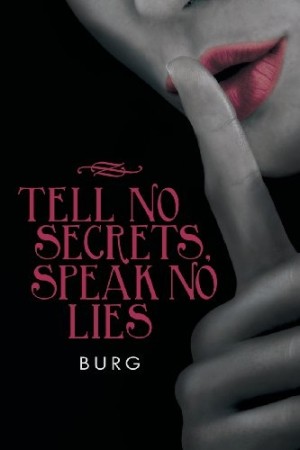
Tell No Secrets, Speak No Lies
Well-rounded characters, realistic situations populate this gritty novel of violence in Birmingham.
“Everybody makes mistakes … Sometimes things happen in the heat of the moment, and we make bad decisions. Now is the time to make things right,” the arresting officer says to Rashard, one of the three characters whose Alabama stories connect in the compelling debut collection of three entwined novellas by Burg. Rashard, a drug dealer, Angel, an abuse survivor, and T-Zoe, a career robber, all conceal the truth from loved ones in Tell No Secrets, Speak No Lies.
Rashard’s errors go beyond dealing drugs; Angel’s molestation triggers her hasty decisions, but her character remains nuanced; and T-Zoe becomes more than a stereotypical thug. All three African-American youths struggle to survive in gritty Birmingham, a place beset by violence.
A kingpin with a conscience, Rashard loves his girlfriend and mother of his children, Kanisha. He immediately shows remorse for hitting her, and he feels trapped between supporting his family and the inherent danger in his chosen profession. When the police arrest him for murder, Rashard confesses.
Burg lays out in stark terms the guilt that victims like Angel can feel: “She lay still as [her stepfather] resumed touching her. He had been molesting her since she was eleven. … [He] made Angel believe that she was the only reason that he allowed her and her mother to continue living with him. Angel felt a sense of responsibility. … She believed she had to help her mother out, anyway she could.”
Angel’s sense of duty causes her to withstand her stepfather’s cruelty without telling her mom, even as she does well in school and spurns the advances of a boy she likes because he already has a girlfriend. Some of the most excruciatingly realistic scenes in the book involve the mother yelling at her daughter for disrespecting her stepfather, while the girl remains silent in the face of her mom’s anger, not wishing to expose her own torment. Angel also keeps quiet because her stepfather threatens to harm her if she speaks out. It tugs at the heart to watch Angel pretend to be a normal high-school student while she is burdened by her shameful secret.
Meanwhile, T-Zoe must support his girlfriend and their son. While his girlfriend has a legitimate job, she doesn’t make much money. T-Zoe, Angel’s cousin, has only the skills of breaking and entering. T-Zoe steals to support his family—and so his girlfriend will stop hounding him about money. When he and his associates attack Rashard’s house, things spiral out of control.
Although the characters are well rounded, the text sometimes has a blow-by-blow redundant quality typical of new novelists: “The detective stood up and exited the room. A police officer came in shortly after he left and placed handcuffs on Rashard’s wrists.”
On the subject of police, in two stories the characters voluntarily contact lawmen. Given widespread racial profiling and police brutality, it seems unbelievable that an African-American drug dealer, and the African Americans involved in T-Zoe’s heist, would readily contact the cops, and further, that only one officer would be blatantly racist.
A needless epilogue blunts the emotional impact of the story by summarizing the characters’ future fates and hammering home the already obvious theme. These first-time author hiccups, however, are overshadowed by the way Burg touches on so many issues common to violence-plagued areas and allows readers to empathize with his characters, even though the audience may not condone their actions.
Reviewed by
Jill Allen
Disclosure: This article is not an endorsement, but a review. The publisher of this book provided free copies of the book and paid a small fee to have their book reviewed by a professional reviewer. Foreword Reviews and Clarion Reviews make no guarantee that the publisher will receive a positive review. Foreword Magazine, Inc. is disclosing this in accordance with the Federal Trade Commission’s 16 CFR, Part 255.
